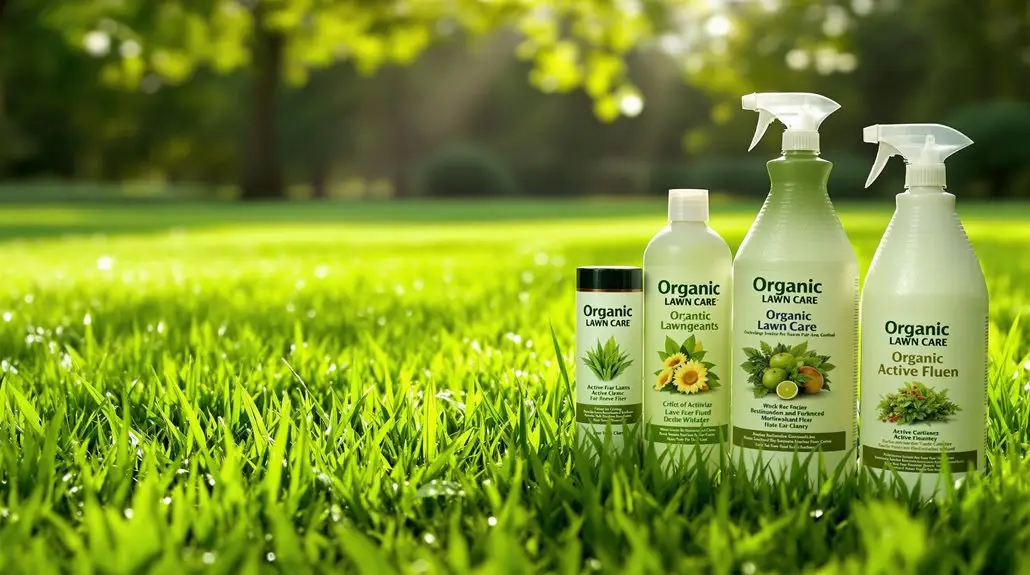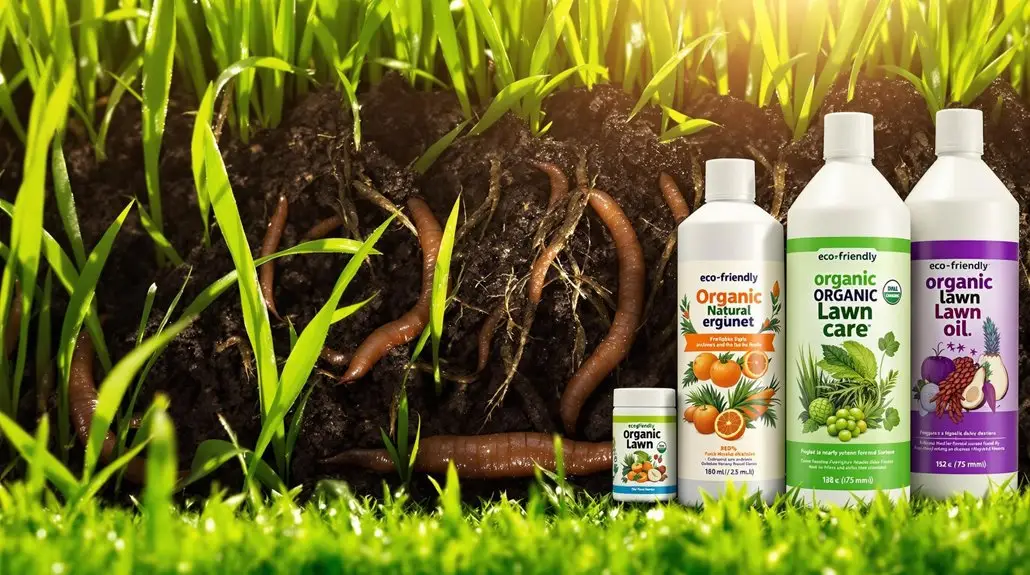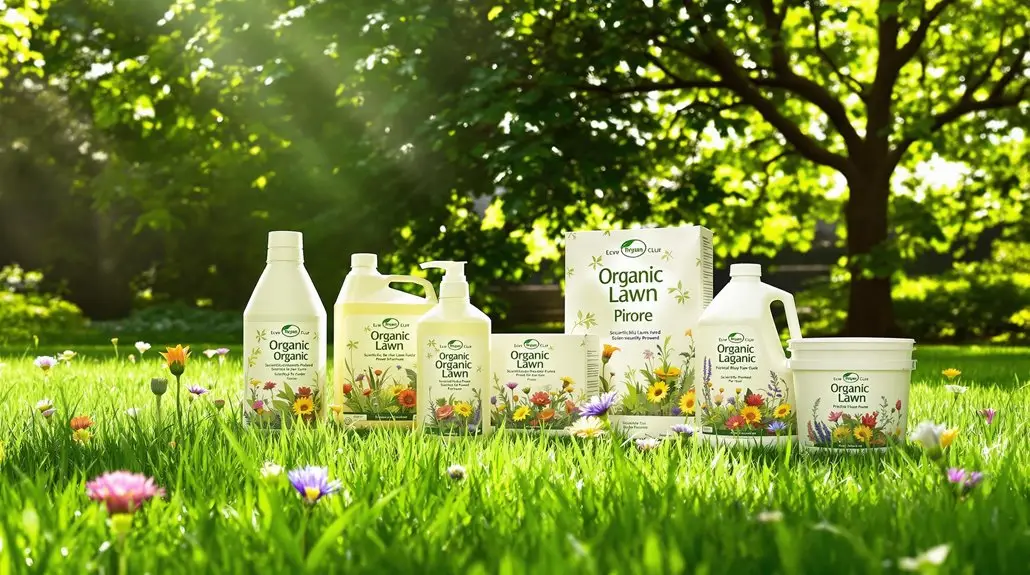If you’re looking for organic lawn care products that truly work, focus on those with scientifically proven active ingredients. Nutrients like nitrogen, phosphorus, and potassium are essential for root development and overall lawn strength. Products like Jonathan Green Organic Lawn Food and EC Grow 18-0-3 provide balanced nutrition without harmful chemicals. Using natural fertilizers such as compost or fish emulsion improves soil health and microbial activity, guaranteeing long-lasting effects. Additionally, applying these products at the right time will maximize their benefits. Explore the best options to guarantee a vibrant, thriving lawn that’s secure for kids and pets.
Key Insights
- Active ingredients like nitrogen, phosphorus, and potassium in organic fertilizers significantly enhance lawn health and resilience against pests and diseases.
- Products such as Jonathan Green Organic Lawn Food and EC Grow 18-0-3 provide balanced nutrients without harmful chemicals.
- Incorporating natural ingredients like compost and seaweed improves soil structure, microbial activity, and nutrient retention.
- Using slow-release organic fertilizers minimizes nutrient leaching and promotes sustained lawn growth over time.
- Regular soil testing and proper application timing optimize the effectiveness of organic fertilizers, ensuring healthy lawn development.
Importance of Active Ingredients

Understanding the importance of active ingredients in organic lawn care products can greatly enhance your lawn’s health and vigor. When you choose products rich in essential nutrients like phosphorus, nitrogen, and potassium, you’re setting the foundation for a thriving lawn.
Phosphorus promotes strong root development and is essential for plant growth. It helps your plants develop flowers, fruits, and seeds, leading to a vibrant ecosystem in your yard.
Nitrogen is another critical ingredient that makes your lawn “green up.” It contributes to leaf growth and is fundamental for synthesizing amino acids and chlorophyll. You’ll want to source nitrogen from natural options like fish emulsion or compost to guarantee your lawn flourishes without harming the environment through over-fertilization.
Potassium feeds your lawn over time, supporting its recovery from drought and disease. It also helps your grass resist pests and diseases, making your lawn more resilient. Sourcing potassium from natural minerals enhances overall soil health, further enhances the overall health of your soil.
Incorporating other natural ingredients, like compost and seaweed, boosts soil structure and microbial activity. These elements work together to create a healthy, thriving environment for your grass and plants.
You’ll notice that with the right organic products, your lawn not only looks better but feels like a welcoming space for family and friends. By understanding and utilizing these active ingredients, you’re fostering a vibrant community in your own backyard.
Key Benefits of Organic Fertilizers
Organic fertilizers offer a range of key benefits that can transform your lawn into a thriving, resilient space. By nurturing the soil and supporting beneficial microorganisms, these fertilizers create a vibrant ecosystem that can withstand various environmental challenges.
Here are some standout advantages you’ll appreciate:
- Enhanced Soil Health: Organic fertilizers improve soil structure and increase its water retention, making it easier for your lawn to flourish. This not only promotes growth but also supports the natural balance of beneficial microorganisms in the soil. Additionally, using natural fertilizers can further enhance the health of your lawn.
- Environmental Protection: By reducing nutrient runoff, organic options help protect local water sources and wildlife, aligning your lawn care with eco-friendly practices.
- Security for Loved Ones: With no harmful chemicals, organic fertilizers create a secure environment for your children, pets, and local wildlife, allowing everyone to enjoy the outdoors without worry.
- Long-Term Cost-Effectiveness: These fertilizers break down gradually, offering continuous nourishment while saving you time and money on frequent reapplications.
- Natural Resilience: A lawn nourished with organic fertilizers develops deep roots, making it more resilient against pests and harsh weather.
Choosing organic fertilizers isn’t just about improving your lawn; it’s about committing to a sustainable lifestyle that benefits your family and the planet.
When you opt for organic solutions, you’re not just caring for your lawn—you’re fostering a healthier environment for everyone. Embrace the change and enjoy the beauty of a naturally thriving lawn!
Types of Organic Fertilizers

Choosing the right type of organic fertilizer can greatly impact your lawn’s health and vigor. When you understand the different categories, you can make informed decisions that resonate with your gardening goals.
Animal-based organic fertilizers, like manure and bone meal, offer rich sources of essential nutrients. Manure, for instance, provides nitrogen and potash, while bone meal acts as a slow-release phosphorus source, perfect for long-term growth. Blood meal can energize your leafy plants, and fish emulsion delivers fast-acting nutrients but requires careful application due to its acidity. Chicken litter is another excellent choice, as it combines manure and sawdust, enriching your soil with high nitrogen and potash levels.
On the other hand, plant-based organic fertilizers like compost and cottonseed meal enrich your soil naturally. Compost enhances soil structure, while cottonseed meal regulates pH and offers a balance of nutrients. Alfalfa meal and corn gluten meal are also excellent choices, providing slow-release nitrogen and promoting healthy growth in leafy vegetables.
Mineral-based options, such as rock phosphate and Epsom salt, help manage soil pH and provide essential minerals. You can also consider vermicompost, which is a nutrient-dense product from worms, or chicken litter, a blend of manure and sawdust that boosts nitrogen levels.
Each type of organic fertilizer has its unique benefits, and knowing what your lawn needs will help you cultivate a thriving green space that reflects your dedication to sustainable gardening.
Effective Application Techniques
To get the most out of your organic lawn care products, timing is key. Applying fertilizers during the growing season guarantees your lawn can absorb the nutrients effectively. You’ll also want to incorporate these products properly for the best results, whether through spreading, watering, or aerating. Additionally, using organic fertilizers not only simplifies lawn management but also enhances soil structure and health.
Timing for Optimal Results
Timing is essential for achieving ideal results when applying organic lawn care products. You want to guarantee that your lawn receives nutrients when it can truly benefit from them.
For cool-season grasses, apply fertilizers in the fall and early spring, while warm-season grasses thrive with applications in late spring and early summer. Remember to avoid extreme weather conditions like drought or heavy rain, as these can hinder absorption.
Here are some key tips to reflect on:
- Apply fertilizers when the soil is moist to enhance nutrient uptake.
- Conduct soil tests to determine the best timing based on soil conditions.
- Monitor local climate trends to tailor your application schedule.
- Combining applications with other organic practices for a holistic approach can further improve soil health, which is crucial for nutrient digestion.
- Stay patient; organic fertilizers release nutrients slowly, promoting healthy growth over time.
Incorporation Methods for Success
For successful incorporation of organic lawn care products, effective application techniques are essential. Start with soil preparation by adding organic matter like compost or manures to improve soil structure. This guarantees better drainage, water retention, and aeration. Mixing this organic matter into the soil before seeding will enhance your lawn’s overall health. Soil quality is crucial for the transition to organic methods, as it lays the foundation for a resilient lawn. Additionally, maintaining community awareness of sustainable practices can further support local ecosystems.
When applying organic fertilizers, opt for slow-release formulas to prevent leaching and runoff, which helps keep your lawn thriving while protecting the environment. Use granular fertilizers for even distribution, minimizing the risk of burning your grass.
Water your lawn after application to activate the nutrients, and always be cautious about overapplication, as this can lead to imbalances. Consider blending your fertilizers with natural conditioners, and don’t forget to encourage microbial activity. Incorporating humic substances and natural gypsum can greatly boost soil health.
Combining these organic practices with cultural methods—like selecting resistant turfgrasses and recycling organic waste—will create a robust lawn ecosystem. Remember to monitor soil health regularly, adjusting your practices as needed. With these techniques, you’ll foster a vibrant lawn that belongs to your community of fellow organic gardeners.
Environmental Benefits

When you choose organic lawn care products, you’re actively supporting a chemical-free ecosystem that benefits both your yard and the environment. These products improve soil health, creating a thriving habitat for beneficial microorganisms and promoting biodiversity. Additionally, using 100% organic lawn fertilizer helps eliminate reliance on synthetic chemicals, further enhancing the sustainability of your lawn care practices. This commitment to organic methods aligns with NaturePest’s approach to natural and organic pest control, which minimizes the use of harmful chemicals and supports a healthier ecosystem.
Chemical-Free Ecosystem Support
A healthier lawn can greatly enhance your yard’s environmental benefits, starting with water quality protection.
By choosing organic lawn care products, you help prevent harmful chemicals from leaching into groundwater and waterways. These slow-release fertilizers reduce the risk of pollution and support cleaner ecosystems for everyone.
Here are some ways your organic choices create a positive impact:
- Cleaner Water: Organic fertilizers minimize contamination, ensuring healthier water sources for your community.
- Lower Emissions: Using organic products cuts down on greenhouse gases, supporting a healthier planet.
- Biodiversity Support: These fertilizers protect beneficial insects and microorganisms, keeping your ecosystem thriving.
- Sustainable Practices: Embracing organic methods strengthens environmental stewardship, benefiting future generations.
- Healthy Soil: Organic fertilization maintains soil structure, reducing nutrient runoff and fostering a balanced ecosystem.
Soil Health Improvement
Improving soil health is essential not just for your lawn’s vibrancy but also for the environment. When you focus on enhancing soil quality, you’re not just nurturing grass; you’re fostering a thriving ecosystem. Here’s how organic practices can make a difference:
| Benefit | Description | Environmental Impact |
|---|---|---|
| Soil Structure Enhancement | Increases porosity, drainage, and aeration. | Reduces runoff and improves water quality. |
| Microbial Activity Boost | Encourages beneficial microorganisms. | Supports natural nutrient cycling. |
| Organic Matter Incorporation | Adds compost, enhancing structure and fertility. | Diverts waste and promotes sustainability. |
| Nutrient Cycle Optimization | Provides slow nutrient release. | Minimizes leaching and chemical use. |
| Overall Soil Health Improvement | Reduces compaction and enhances nutrient retention. | Promotes diverse plant growth and resilience. |
Implementing organic practices not only enriches the soil but also contributes to a healthier environment by minimizing harm to ecosystems and preventing water pollution.
Biodiversity Promotion
Enhancing soil health naturally leads to greater biodiversity in your lawn. When you use organic fertilizers, you’re not just feeding your grass; you’re fostering a thriving ecosystem beneath the surface.
These natural products inspire beneficial microbial activity, supporting a variety of soil organisms like earthworms and helpful insects. Here are some ways this benefits you and your lawn:
- Encourages a balanced ecosystem, reducing the need for harmful pesticides.
- Improves soil structure for better air and water movement.
- Supports healthy turfgrass, which invites a wider range of flora and fauna.
- Minimizes nutrient runoff, protecting local water biodiversity.
- Reduces the risk of soil contamination, nurturing a healthier environment.
Recommended Organic Products
When it comes to maintaining a lush, green lawn, choosing the right organic products can make all the difference. You want your lawn to thrive, and using high-quality organic fertilizers is key to achieving that vibrant look while being kind to the environment.
Consider EC Grow 18-0-3 All Purpose Organic Blended Fertilizer. This product features non-staining iron and non-leaching phosphorus, making it a fantastic choice for long-lasting results.
Another great option is SuperCal SO4 Organic Lawn Fertilizer, which improves water infiltration by delivering essential calcium and sulfur.
For those looking to enhance soil health, Black Gypsum DG combines natural gypsum with humic substances, providing sulfur, calcium, and Humate that benefit your lawn.
Don’t overlook Jonathan Green Organic Lawn Food, made from all-natural ingredients, offering a balanced blend of nitrogen, soluble Potash, calcium, sulfur, and iron.
Understanding Soil Health

Understanding soil health is vital for achieving a vibrant lawn, as it directly influences your grass’s growth and resilience. To get started, consider conducting a thorough soil test. This will help you identify any nutrient deficiencies and pH levels, which are essential for a thriving lawn.
Simply collect soil samples from several areas of your lawn, aiming for about 2 cups of soil. You can often find local nurseries or university extension offices that offer soil testing services.
Here are some key points to keep in mind about soil health:
- Ideal pH: Aim for a pH range of 6.0-7.5, with 6.3-6.8 being best.
- Nutrient Availability: Proper pH levels enhance nutrient availability and support healthy soil microbes.
- Organic Matter Matters: Adding fibrous compost and leaving grass clippings can greatly improve soil structure.
- Moisture Retention: Healthy soil retains moisture better, reducing your need for frequent watering.
- Earthworms: A thriving population of earthworms is a strong indicator of soil health. Additionally, a focus on healthy soil ecosystems promotes a self-sustaining lawn that requires minimal intervention.
Frequently Asked Questions
How Do Organic Fertilizers Compare to Synthetic Options in Cost?
When you compare organic fertilizers to synthetic ones, you’ll notice that organic options often come with a higher initial cost.
However, over time, organic fertilizers can save you money by improving soil health and reducing the need for frequent applications.
While synthetic fertilizers might give quick results, they can degrade your soil, leading to more expenses down the line.
Ultimately, investing in organic methods promotes a healthier lawn and a more sustainable environment for everyone.
Can Organic Fertilizers Be Used on All Types of Grass?
Yes, you can use organic fertilizers on many types of grass.
They’re versatile and work well across various species, promoting healthier growth. Organic options improve soil structure and enhance water retention, making your lawn more resilient.
While some grasses, like turf-type tall fescue, thrive particularly well, most grass types will benefit from the slow-release nutrients and beneficial microbes found in organic fertilizers.
You’ll notice a healthier lawn with less maintenance over time!
What Is the Shelf Life of Organic Lawn Fertilizers?
The shelf life of organic lawn fertilizers varies, but you can generally expect them to last between one to five years.
Nitrogen-rich fertilizers might lose potency quicker, especially in humidity. Microbial inoculants have the shortest shelf life, around two years.
To keep your fertilizers effective, store them in a cool, dry place, away from direct sunlight and moisture.
Proper storage really makes a difference, so take care of your products!
Are There Any Specific Storage Requirements for Organic Fertilizers?
When it comes to storing organic fertilizers, you’ll want to keep them in a dry, well-ventilated space away from sunlight and moisture.
Use airtight, waterproof containers, and label them clearly.
Make sure the temperature stays between 40°F and 80°F, avoiding extreme fluctuations.
Always handle fertilizers carefully, wearing gloves to protect your skin.
Regularly check the storage area to keep it clean and free from pests, ensuring your fertilizers remain effective and secure.
How Quickly Can I Expect Results From Using Organic Fertilizers?
When you use organic fertilizers, don’t expect immediate results.
It usually takes about 4-6 weeks for you to see some visible improvements, but full benefits might take up to 3-4 months.
This slower process helps build healthier soil, which means your plants will thrive in the long run.
Transform Your Lawn Naturally: Embrace Organic Care with NaturePest Holistic Pest Control!
As you nurture your lawn with organic care products, imagine a vibrant green carpet stretching across your yard, teeming with life. By choosing scientifically proven active ingredients, you’re not just feeding your grass; you’re cultivating a thriving ecosystem. The earth beneath your feet becomes a sanctuary for beneficial microbes, while your family enjoys a secure, chemical-free space to play.
Embrace organic solutions with NaturePest Holistic Pest Control in South Florida and watch your lawn transform into a lush, healthy paradise that’s both beautiful and sustainable. Take the first step towards a greener future today—visit our website to explore our range of effective organic lawn care products and join the movement for a healthier planet!


